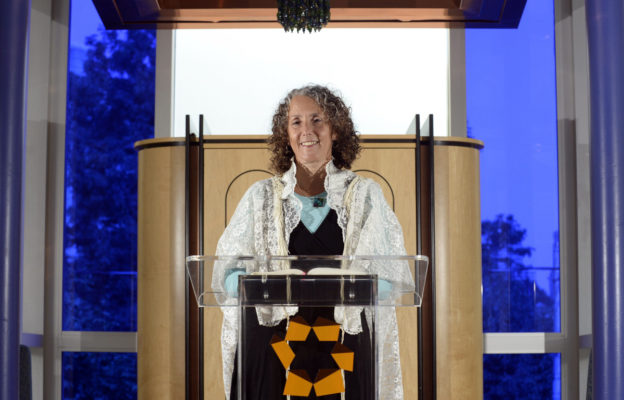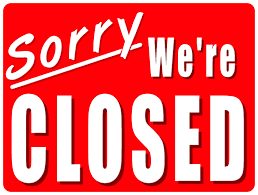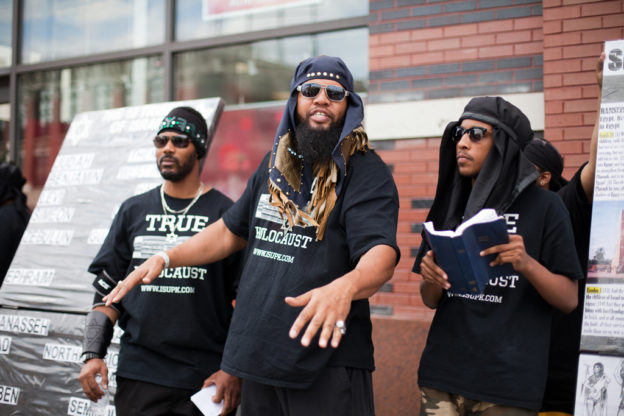An article of mine about the Orthodox Union’s quandary over how to deal with member-congregations with women clergy can be read here.


An article of mine about the Orthodox Union’s quandary over how to deal with member-congregations with women clergy can be read here.

It made many people very happy.
Especially dentists.
“It” being the report widely circulated over recent weeks that an ice cream breakfast will make you smarter.
The claim first appeared on a Japanese news site, citing a study by Professor Yoshihiko Koga at Tokyo’s Kyorin University. According to the story, Professor Koga found that people who ate ice cream for breakfast had faster response times and more brainwave activity than a control group. “Break out the Klein’s!” was my personal brain’s first, spirited reaction.
The wonderful news, which, of course, runs counter to virtually everything nutritionists believe about a healthy first meal of the day, made its way to the British newspaper The Telegraph, and, from there, to media like Newsweek, CBS broadcasts and The Washington Times.
Before you plan on a scoop of mint chocolate chip to start tomorrow, though, please note that the control group didn’t eat a “normal” breakfast. In fact, its members didn’t eat breakfast at all. So, playing Sherlock Holmes, we might suspect that the reason the ice cream eaters did better was because they actually ate breakfast (and sugar, which in excess contributes to a host of serious medical problems, indeed provides at least a short-lived boost to brain function).
In the words of Reading University researcher Katie Barfoot, “A possible explanation [for the increased alertness]… is the simple presence of consuming breakfast vs. not consuming breakfast.” Possible, yes.
The original report of the study, by the way, mentions, en passant, that the research was conducted in partnership with an unnamed sweets company. Watson, I believe we have a motive.
Less mouth-watering and more potentially dangerous than even excessive consumption of sugar was some other material disseminated last year but whose extent has only recently come to light.
Back in June, former F.B.I. director James B. Comey testified before the Senate Intelligence Committee that there was “massive” Russian interference in last year’s presidential election. “There should be no fuzz on this whatsoever,” he declared. “The Russians interfered in our election during the 2016 cycle. They did it with purpose. They did it with sophistication. They did it with overwhelming technical efforts.”
Among those efforts, it is now known, thanks to an investigation by The New York Times and research from the cybersecurity firm FireEye, that last year a Russian-controlled cyberarmy of impostors created counterfeit social media accounts aimed at influencing the election.
The Russian information attack included the hacking and leaking of Democratic emails, and a torrent of stories, true, false and in-between in Russian media like cable channel RT (“Russia Today”) and the news agency Sputnik.
More insidious still was Russia’s hijacking of American social media to present information, and misinformation, behind cybermasks. Electronic means used by millions were repurposed as engines of deception and propaganda.
Take Melvin Redick of Harrisburg, Pa., for example. In his photo, he smiled broadly, wore a backward baseball cap and held a young child on his lap. He urged others to check out a brand-new website.
“These guys show hidden truth about Hillary Clinton, George Soros and other leaders of the U.S.” he wrote on June 8, 2016. “Visit DCLeaks [a website]. It’s really interesting!”
Mr. Redick, however, doesn’t exist. His ostensible photo was in fact of an unsuspecting Brazilian, “borrowed” without permission. The site purporting to be his was linked to the Russian military intelligence agency.
It supplied private information stolen by hackers and presented to discredit the Clinton campaign and its supporters.
Elections, alas – I hope you’re sitting down – are less influenced by intelligent analyses of issues and candidates’ records and statements than they are by selective information, real or otherwise, in context or out of it, offered to the public in a way that stirs bile, not brains.
So, whatever the truth, or truthiness, of the material that was proffered by the non-existent Mr. Redick and literally thousands of thousands of social media ads devoid of context and promoting divisive social and political messages over the course of the months leading up to the election, the meddling of a foreign (and far from benign) power is meaningful.
Chazal teach that, when the “footsteps” of Moshiach are close, ha’emes tehei ne’ederes, “truth will go missing” (Sotah 49b).
The contention that ice cream is a good breakfast idea is a relatively easy untruth to discern. That an supposed person is in fact not a person at all, or that purported “news” media are in cahoots with a foreign autocrat, a good deal less so.
So, as you sit down, I hope, to a healthy breakfast tomorrow, ponder the fact that today, in news as in the marketplace, caveat emptor, let the consumer be aware.
© 2017 Hamodia

 A piece I wrote for the Forward today about the conference call the White House has set up with a number of American rabbis, can be read here.
A piece I wrote for the Forward today about the conference call the White House has set up with a number of American rabbis, can be read here.

I appreciate that my friend of many years Rabbi Menken ( http://hamodia.com/2017/09/12/one-mans-ceiling-another-mans-floor/ ) agrees with me that treating political affiliations like sports teams is wrong, as is attaching ourselves to political positions (or parties, as I wrote in the piece he critiques) to the point of justifying the unjustifiable.
We disagree, however, about whether, as he claims, only “one political party” can rightly be supported by Torah-conscious Jews. He asserts that “to be a mainstream Democrat today, one must support” things like redefining marriage. Such redefinition, however, is no longer an issue, as it is, for better or worse (worse), not only the Supreme Court-established law of the land but embraced by many Republicans, simple citizens and legislators alike.
Rabbi Menken also attributes to the Democratic Party an “increasing” belief that Jews are stealing Palestinian land, and, by extension, its reflection of ancient anti-Semitic canards.
I don’t know what he has in mind, but what I do know, as should he, is that both sides of the aisles in both houses of Congress are staunch and proven defenders of Israel’s security needs. And that during last year’s presidential campaign, attempts by Bernie Sanders and Jim Zogby to insert “occupation” and other “evenhanded” language in the Democratic platform were summarily and effectively quashed by the Democratic mainstream; and that the Democratic platform explicitly opposed the BDS movement.
It did endorse the eventual goal of a two-state solution, but if that constitutes some sort of updated Jew hatred, Israeli Prime Minister Netanyahu, along with some other very fine supporters of Israel, would qualify as anti-Semites.
But I don’t want to be put in a position of doing precisely what I decried in my original article, singing the praises of any party. My entire point was that mindless partisan politics and Torah-consciousness do not mix. Or should not. There are times when “conservative” values serve Klal Yisrael best, and times when “liberal” ones do; issues regarding which one party best reflects our concerns, and issues about which the other one does; and individual legislators who are on our side regarding some issues but not others. What is more, representatives of either party may themselves hold different positions from their own colleagues. What should matter alone to us is what is best for Klal Yisrael. And indiscriminate partisanship does not serve that goal.
As to Charlottesville, the “Unite the Right” gathering was explicitly billed in its promotional literature as a show of “white” strength; its official poster, in fact, was clearly modeled on Nazi posters, complete with birds pointedly reminiscent of the Nazi eagle darting through the sky, with Confederate flags in the place of the swastikas.
And actual swastikas were held aloft by rally participants, as many hundreds of them marched at night with torches, chanting angrily “Jews will not replace us!” and “Blood and soil!” – an English rendering of the Nazi “blut und boden.”
The counter-protest, by contrast, was organized by a coalition of peaceful rights groups: Peoples Action for Racial Justice, Together Cville and Charlottesville Center for Peace and Justice. According to their advertising, their march was to be “a peaceful protest against all forms of white supremacy, racial intolerance, and discrimination.”
And it largely was just that. Some violent elements also crashed the protest and police didn’t seem to make efforts to stop violence between them and similar elements among the supremacists. But in no way was the counter-protest a mirror of the supremacist rally. The vast majority of the former were demonstrating against hatred; the vast majority of the latter were expressing it.
And no number of “first hand” anecdotes, no matter how compelling, can obscure that fact.
The president, on two occasions, seemed to pointedly equate the supremacists and the anti-hate group. For that Rabbi Menken offers his “gratitude.” That, though, is precisely the sort of blunt partisanship and hero worship I consider so harmful. One needn’t be an opponent of Mr. Trump to acknowledge the inaptness of his apparent comparison. In fact, among the myriad groups that did so was the Republican Jewish Coalition. Rabbi Menken seems here to be, as they say, “more Catholic than the Pope.”
The president’s comments were not merely “politically” misguided, they were morally wrong. That does not make him a bad person or an enemy, chalilah, but neither does it make him a hero.
I do not understand the pertinence of Rabbi Menken’s mention of media that tried to connect car attacks by Muslim terrorists in Europe with the supremacist who drove his car into a peaceful crowd in Charlottesville, but I certainly join him in his skepticism about that assertion.
Nor do I fathom the relevance here of the contrast between Israel’s humanitarianism and her Arab enemies’ celebration of murder. I have, in fact, written about that staggering contrast on several occasions.
And so, my bottom line remains what the first lines of my original column contended: We American Jews who are faithful to Torah must advocate our interests and our ideals, but judiciously. We must not fall into the contemporary trap of becoming partisan cheerleaders instead of prudent champions.
© 2017 Hamodia

It’s safe to say that many of us are less than exercised over the public debate about Confederate-era statues on public lands. It may animate those with a dog in the race, so to speak, like African-Americans, some wistful white Southerners and pigeons. But the conventional community wisdom is that it is hardly an issue that need concern us.
Before explaining why I disagree, some facts (always a good idea):
While those who oppose the removal of public-space statues honoring Confederate leaders assert that only a tiny minority of radical, “progressive” elements wish to take down the stone tributes, a recent Reuters/Ipsos poll showed that more than a quarter of all Americans favored removing the statues. Another 19% said they were conflicted.
The statues, moreover, their advocates maintain, are merely meant to honor brave Civil War heroes who fought for their vision of the United States.
The vast majority of the controversial statues, however, were erected well after the end of that war, and in fact peaked in the early and mid-1900s. Just when, as it happens, many states were enacting Jim Crow laws to disenfranchise black Americans.
Historians don’t consider that confluence of events to be meaningless. As James Grossman, the executive director of the American Historical Association, observed: “These statues were meant to create legitimate garb for white supremacy. Why [else] would you put a statue of Robert E. Lee or Stonewall Jackson in 1948 in Baltimore?”
Moving from facts to assertions, the statue-protectors claim that history will be threatened by the monuments’ removals, as the statues are reminders of the war that split the nation during the early 1860s.
History, though, is safe, preserved as it has been and will continue to be, by more effective means than stone figures, things like history books and school curricula.
Finally, those who oppose tampering with the monuments point out that there will be no end to such undertakings. George Washington and Thomas Jefferson, after all, were slave owners. Shall we dismantle their memorials too? As President Trump asked rhetorically at his August 15 press conference, “Where does it stop?”
That latter argument seems reasonable at first thought; but at second thought, less so. The statues that many citizens feel don’t belong on public land are of men who championed or symbolize slavery, not those who simply, like countless Americans, took advantage of the institution when it was a regrettable but accepted social norm.
And, contrary to the view of a handful of suddenly popular revisionist historians, while the Civil War was fought for a number of reasons, like states’ rights and economic independence, slavery was, in the words of the Confederate vice-president Alexander H. Stephens, “the immediate cause of the late rupture and the present revolution” of Southern independence. Stephens continued by explaining that the Confederacy rested “upon the great truth that the negro [sic] is not equal to the white man; that slavery, subordination to the superior race, is his natural and moral condition.”
There was a reason, after all, that all of the Confederate states were slave states, and that all of the free states remained in the Union.
Why, though, should we care about the statues? The answer, in a word, is empathy.
Leave aside the very real implications here of darkei shalom – which is not, as some “scholars” suggest, some “meta-halachic” novelty but the expression of an essential Torah concept. Feeling the pain of another is a central mussar goal. And while it may most directly have impact on the pain of fellow members of Klal Yisrael – our own “family” – the middah itself stands on its own as an ideal, one to be cultivated and internalized.
That millions of fellow human beings are offended by towering reminders of their dreadful history in our country should at very least make us consider “what is hateful,” to use Rabi Akiva’s formulation, to us, to wonder how we would feel were there a swastika monument, or a statue of American Nazi Party founder George Lincoln Rockwell – who merely hated and didn’t really harm Jews – on the front lawn of a courthouse or in a public park.
If one’s answer to that question is “eh, no big deal,” then unconcern for the hundreds of public tributes to proponents of the enslavement and mistreatment of a people is at least consistent.
But if one’s answer is that a stone swastika or a Nazi on a pedestal, his hand outstretched in tribute to his vision, is offensive, then we need to recognize, and appreciate, why others are irritated by very real tributes to very real racism.
© 2017 Hamodia

Among contemporary American life’s many negative influences on Torah-conscious Jews is a subtle one that is generally overlooked.
We don’t need reminders of the pernicious impact of the surrounding society’s denial of eternal truths, embrace of immorality, lack of any semblance of tznius or obsession with material comforts and possessions. Well, actually we do need such reminders, and receive them from our manhigim.
But we seldom hear about a spiritual ill that, at least to my lights, seems to be running wild among even Jews who are otherwise committed to Torah: Political bandwagon-jumping.
I’m not referring, of course, to responsible shtadlanus, whose primary and most responsible practitioner is the organization I am privileged to work for (but, I remind readers, in whose name I do not write in this space), Agudath Israel of America.
The judicious and delicate execution of shtadlanus, interaction with government officials – which was pioneered in the U.S. by the likes of “Mike” Tress and Rabbi Moshe Sherer, zichronom livrachah – is vital, although not a simple thing. People like my esteemed colleagues Rabbi Chaim Dovid Zwiebel and Rabbi Abba Cohen, with the guidance of Gedolim, admirably carry on those pioneers’ work in a duly careful and conscientious manner.
My concern is with something else, what might best be called the “political sports team mentality” popular with so many simple-minded Americans, but which has been seeping, heavily of late, into the Torah-dedicated world as well.
Otherwise intelligent individuals gleefully glom onto particular political parties or politicians, usually for some (at least arguably) rational reason, but then, when faced with the championed party’s or person’s wrongheaded actions, words or behavior, are unable to let go. The fans bend over backward to justify the unjustifiable, because, well, it’s their player or their team.
And, conversely, the “opposing team” is a no-good bunch of bums, and can do no right. A leader or legislator can act laudably but, if he is on the wrong side of the designated partisan divide, will be criticized for being hypocritical, having a hidden agenda or just for not having done more.
Is this what our community has come to, a quieter but no less mindless version of the rowdy crowds who heartily chant “Yes, we can!” or “Lock her up!”?
Something’s gone missing in parts of our community and some of its organs’ political positions and commentary. Actually a few things. One is humility.
That is to say, there are seldom simple answers to complex political issues – which most political issues are. Yes, there are certainly occasions when it is clear that a particular piece of legislation or political candidate is worthy, or the opposite.
But in most cases, things are not entirely as they are portrayed by either the New York Times’ editorial page or talk radio personalities. And only a careful hearing-out and honest consideration of all sides of an issue, be it immigration or free trade or Confederate statues or even a potential peace process in the Middle East, has a chance of yielding an informed, objective position. Mindless team spirit is no path to emes. Sometimes, even, as conservative columnist David Brooks recently observed, “The truth is plural.”
Thoughtful, truth-consistent positions come from research and objective analysis, not the rantings or self-righteousness of partisan players. Assertions, even if one hears them shouted on the radio or sees them, as the wry joke goes, “on the internet!,” are not necessarily actual facts.
An actual fact is that, at the “Unite the Right” rally earlier this month in Charlottesville, one side was entirely composed of white supremacists of varied stripes but the other was mostly comprised of non-radical, non-violent opponents of white supremacy. And that the former group contained no very fine people. And, on the other hand, that neither Steve Bannon nor President Trump is an anti-Semite.
An actual fact is that it wasn’t “the media” alone that was disturbed by the president’s seeming comparison of the two groups, but also leading Republican lawmakers, staunchly conservative periodicals, commentators like Charles Krauthammer, members of the Joint Chiefs of Staff, U.S. Ambassador to Israel David Friedman and, lihavdil, a number of respected Rabbanim.
An actual fact is that, as Senate Majority Leader Mitch McConnell recently observed, “Most news is not fake.”
Mr. Brooks made another observation about political “zealots.” They turn politics, he wrote, “into a secular religion.” In our case, actually, it’s much worse. They turn religion – ours – into political tools, and even attempt to utilize statements of Chazal and divrei Torah to buttress their partisan positions. That’s indefensible.
As is the entire “sports team” mentality in politics. We are, or should be, better than that.
© 2017 Hamodia

“Le roi est mort, vive le roi!”
That’s the famous French declaration that was traditionally made when a monarch had breathed his last: “The king is dead. Long live the king!”
Recent days have revealed the news that a slogan has expired. The late phrase is “Open Orthodoxy.” No longer will it be employed by the institutions that once proudly held it aloft as a banner. It has been summarily dispatched, sent to its grave. But what the phrase stood for, at least for now, lives on.
It was disclosed last week that back on July 26, The New Jersey Jewish News received a communication from “Yeshivat Chovevei Torah,” or “YCT,” the seminary of the movement that must no longer be named, informing the paper that “We have been referred to as an ‘Open Orthodox Seminary’ by your newspaper, which is incorrect. ‘Open Orthodox’ is not a term that we use to describe ourselves, nor is it part of any language on our site, mission, marketing materials, etc.”
Note the present tense. It is employed because the term now prohibited was in fact the institution’s credo, included even in its mission statement at its founding in 1999, and used thereafter until relatively recently.
Rabbi Avi Weiss, the father of the now-disdained phrase, extolled it when he introduced it as “expressing vibrancy, inclusivity and non-judgmentalism”(implying it seemed, that others lacked vibrancy, rejected Jews and sat in judgment on them – and that they were “closed’), and as conveying the new movement’s embrace of non-traditional ritual roles for women, celebration of people engaged in aveiros chamuros, relaxation of halachic requirements for geirus and encouragement of interfaith “dialogue.”
None of that, of course, has changed, only the unfortunate phrase. The once “open” movement has now claimed an adjective once employed by others but that had fallen into disuse: “Modern”.
What was once called “Modern Orthodoxy,” which never dared abandon what the erstwhile “openers” have happily jettisoned, shed that phrase long ago in favor of “Centrist Orthodoxy.” And so, un-copyrighted as “modern” was, the new group dusted it off and decided it looked nice on them.
The change, though, of course, is cosmetic. The Open/Modern group whose institutions include the earlier mentioned YCT, “Yeshivat Maharat,” which trains female religious leaders, and a small rabbinical association called the International Rabbinic Fellowship (“IRC”) has, if anything, “liberalized” its stances even more.
As the Moetzes Gedolei HaTorah felt compelled to state with sadness two years ago, the Open Orthodox movement “reject[s] the basic tenets of our faith… and [is] no different from other dissident movements throughout our history that have rejected these basic tenets.”
Some leaders of the errant group took umbrage at that statement, which they took as a personal rejection.
But it wasn’t people being rejected, but rather a concept – that the Torah and halachah can be molded, like so much Silly Putty, to comport with “modern” mores.
And, speaking of kindergarten, Humpty Dumpty famously insisted that “When I use a word, it means just what I choose it to mean.” With all due respect to the fictional fellow, in the real world words in fact have objective meanings.
To be sure, words’ meanings can change. Once, not very long ago, a “mouse” was exclusively a furry creature, and “gay” meant only “joyful.” But a theology that is indistinguishable from that of the Conservative movement cannot, pace Mr. Dumpty, be called “Orthodox.”
Over the past century or two, “Orthodoxy” has been synonymous with full acceptance of the mesorah – including, of course, the historicity of Yetzias Mitzrayim; the fact that the Torah Shebichsav and Sheb’al Peh were bequeathed our ancestors at Har Sinai; and that the avos existed – concepts that prominent products of or leaders of the “Open Orthodoxy” movement are on record as rejecting.
So why must the YCT/Yeshivat Maharat/IRC nexus seek any new adjective at all? What it needs is not an adjective but a new noun. And a prefix for it. To wit: “Conservative” and “Neo,” respectively.
Calling themselves a new branch of the faltering Conservative movement, though, would deprive the group of the free publicity and celebration some Jewish media so eagerly offer it. After all, there’s nothing very newsworthy, or for that matter new, about a Jewish movement that “updates” the Torah to “teach” what its leaders feel it should have said.
But, were the guiding lights of the Open/Modern movement truly dedicated to honesty and forthrightness, that’s just what they would do.
© 2017 Hamodia


You may know something about the Sicarii, or Sikari’im (or Sikrikim), the radical Jewish faction at the time of the destruction of the Second Beis Hamikdash.
What you may not know is that their name has been adopted by a small group of Californians who are part of a somewhat larger group of African-Americans who call themselves “Hebrew Israelites.”
The contemporary “Sicarii” hold that the Jewish People are imposters, and that descendants of Africans like themselves are the “true Jews.” They aim to “uplift disenfranchised blacks, Latinos and Native Americans” by teaching that they are the “true descendants of the ancient Israelites.” The group refers to white people in general as “deceivers” or “devils.” Stating the obvious, the Anti-Defamation League calls the Sicarii “anti-Semitic and racist.”
Members of the group are wont to create sidewalk and public space demonstrations of their beliefs and, recently, at one such regular rally in San Diego, a white passerby was allegedly knocked to the ground by one of the self-described “real Jews.”
The group’s leader, one Adonis Glaude (a.k.a. “Ahlazar BanLawya” and “Guerilla Hebrew”), denied that any of his disciples assaulted the passerby, and addressed those who contended otherwise as “you so-called Jews who are not the Jews… you’re the devil.” Helpfully, he added: “This is why we say what we say.”
A number of years ago, I came across a similar group in midtown Manhattan, where its members had set up shop – a makeshift stage and an impressive speaker system – in a pedestrian plaza.
The master of ceremonies was loudly inveighing against people of non-color. He was flanked by his two assistants dressed as he was, in colorful caps and robes adorned with Jewish symbols. Together, they angrily denounced Caucasians – with particular malice for “so-called Jews.” Occasionally, the main man would nudge one of his helpers who had missed a cue to read from the Bible in his hand. The addled assistant, once (or several times) so reminded, would then find the place in his own book and, pointing at it, read a pre-designated verse, stiltedly but with great enthusiasm.
Displayed nearby was a large board inscribed with the names of the “twelve tribes of Israel.” Opposite each was a novel identification: one of twelve African or Caribbean nationalities. Their citizens, the MC shouted, were the “real Jews.”
My immediate reaction was amusement. But then I thought about how tragic it was that beings created b’tzelem Elokim, capable of meaningful accomplishments, imagine themselves worthy of dignity only by belittling others, even stooping to adopt an identity not their own.
No point, I knew, in engaging the pitiable prophets in conversation. Their beliefs were fueled by fantasy, not fact. But I indulged in a little fantasizing myself, imagining what I would tell them if only I might find some crack in the wall of their whimsy.
I would share with them a secret: Klal Yisrael’s chosenness isn’t a trophy, a bed of laurels on which to rest. In the Jewish view of things, I’d explain, being chosen is less a badge than a charge. Yes, we Jews indeed consider our forebears’ merits as extending throughout the generations to encompass their descendants. But the bottom line is that being chosen is an obligation.
What’s more, I would tell them, our special status – unlike the supremacy preached by racists of whatever hue – is available to anyone, of any race, who both recognizes that fact and is sincerely willing to join the Jewish people and undertake its mission. One can, in other words, choose to be chosen.
But admission to the Jewish People requires sincerity and commitment, not placards and loudspeakers. It’s easy to strut about with skullcaps and shout, but undertaking the endeavor of Judaism – humbly assuming the holy yoke of the Torah’s commandments and Jewish observance – is in a different realm entirely.
Then, though, something else dawned. Chazal exhort us to “learn from every man.” Even from “Hebrew Israelites.”
For they are remarkable testimony to how coveted the name “Jew” is, even at a time (have there been others?) when the real “real Jews” are hated by so many. The Sicarii may have no clue about what being a Jew really means, but their desire to assume the mantle is still striking, and worth pondering.
What it should teach us born or properly converted Jews is just how special we really are, how desired is our very identity. And what it should inspire us to do is more seriously set ourselves to the holy mission of being what true Jews are meant to be.
© 2017 Hamodia

If you live in New York City and order a sliced bagel (unlike if you ordered it uncut), you owe sales tax on the item. And if you bought gasoline in New Jersey, you owe tax to New York for the purchase.
There are many arcane technical violations of law (some quite amusing, like talking to someone in an elevator in New York State, or hanging clothes on an outdoor clothesline without a license) of which most otherwise smart people are ignorant, and of which otherwise upright people are regularly guilty. And then there are laws that most of us do know about and willfully ignore, like the prohibition to exceed posted speed limits.
Then, of course, there are serious crimes that are not only prosecutable but rightly prosecuted, like identity theft, Ponzi schemes and egregious tax evasion.
There is also, however, a broad gray area of questionable actions, particularly in realms like tax deductions and participation in government programs, that may or may not be committed intentionally, and may or may not even be clear violations of the law.
Many otherwise honest Americans, including some in the Orthodox community, have fallen prey to making decisions that they may think fall on the right side of the legal/illegal line but in fact do not. And some have even convinced themselves that being on the wrong side of that line isn’t really so terrible.
It is, though, at least in our community. Not only because, if discovered (as it often is), it causes the guilty and their families and their fellow Jews a black eye (and sometimes worse), but also simply because, well, it is not ehrlich.
That Yiddish word, for the uninitiated, refers to something of a combination of “honest” and “honorable.” It is a most important Jewish concept.
Rabbi Shimon Schwab, zt”l, the Rav of Khal Adath Jeshurun in Washington Heights for nearly four decades, famously said at an Agudath Israel “Halacha Conference for Accountants,” on January 24, 1989, that “Those who resort to… dishonesty…while they may have the outward appearance of G-d-fearing Jews, deep down… are irreligious.” Because, he explained, Hashem provides us what we are destined to have; to steal is to deny that fact. He bemoaned the fact that Hashem’s people are viewed as defrauders, and said he pined for the day “when there will be a new definition for ‘to Jew’: to be a stickler for honesty.”
Rav Avrohom Pam, zt”l, the Rosh Yeshivah of Yeshiva Torah Vodaas and member of the Moetzes Gedolei HaTorah, ailing and near the end of his life, recorded a heartfelt speech on November 22, 2000. It was screened the next day at that year’s Agudath Israel convention. The anguish in his voice was born not of his illness but of the pain he felt at having to address the issue.
He characterized a good Jew as someone who is “ehrlich in his profession, in business, with… workers, with… partners…”
When one arrives in the next world, Rav Pam said, quoting the Gemara, “the very first question he is asked is ‘Did you conduct your business with emunah [in good faith]?’”
The word emunah is used there, he explained, echoing Rabbi Schwab – because acting dishonestly in order to “supplement” our income denies G-d’s ability to provide us our sustenance.
Both Gedolim also stated clearly that the same honesty with which a Jew must interact with another Jew must characterize a Jew’s dealings with non-Jews.
I am not writing these recollections or what follows with reference to any recent happening. Only a fool would deign to make assumptions about anyone accused of a crime; both in Jewish law and American law, moreover, the presumption of innocence is a given.
But it can’t be denied that, over the years, there have been confirmed cases of actions, or inactions, by members of the community that were clearly illegal. That reality is unfortunate, and defies easy explanation.
Some suggest – to try to explain the phenomenon, not excuse it – that since religious Jews feel a singularly strong connection to earlier generations, some individuals may have “inherited” a feeling that government – as was the case many years past in other lands – is inherently corrupt, and its laws unworthy of full respect. While there are certainly cases where the American justice system acts unjustly (see: Rubashkin), all know (or should) that the United States is qualitatively different from the oppressive and unethical regimes under which Jews lived for centuries. We American Jews are the most fortunate Jews over the course of our galus.
Others see lapses of honesty to have been born of desperation, itself birthed by the extraordinary pressures brought to bear on observant families, who face special and substantial expenses. That theory too, is offered not to excuse misdeeds, but as the sociological background against which they need to be regarded.
Whatever might (or might not) explain how members of communities beholden to halachah can come to do things that are not ehrlich, it behooves us all to look inward. There is a reason our Viduy is in plural (“ashamnu…”). If anyone in Klal Yisrael is guilty of a sin, on some level it implicates us all. Kol Yisrael areivim.
One worthy pursuit we might consider is intensified education about financial rectitude. Things like Agudas Yisrael’s recent “Law of the Land” webinars and its Halacha Conferences’ business tracks are examples worth emulating. As are the “V’asisa Hayashar V’hatov” events of several years ago, which were created by R’ Chaim Gross, z”l, a Vizhnitzer chassid and (ybl”c) R’ Shmuel Dovid Spira. Knowledge in this realm is crucial, as the lines of the law are not always clear.
But it behooves us, too, as parents and mechanchim, to more often and more forcefully stress the importance of ehrlichkeit. The stories of Gedolim that we relate to our young, which enter their minds and souls at the “ground floor,” so to speak, and color their consciences over their lifetimes, should prominently include not only narratives about the hasmadah and Torah-knowledge and ahavas Yisrael of those who inspire us, but their meticulous honesty and acts of Kiddush Hashem no less. There are many such accounts; they need to be a major part of the “curriculum” and greatly emphasized.
And then there is a sociological change that so needs to be fostered.
Our society has come to regard things that are in truth luxuries as necessities. Much (though certainly not all) of the economic pressures so many of us feel derives from a perceived need for a certain kind of home or car or vacation or summer bungalow. There’s nothing wrong with a late model car or overseas trip – if one can easily afford them. But there very much is if one cannot.
Something akin to shame is felt by those of us who, nebbich (sarcasm intended), have a one-man-band at a child’s chasunah, or have run-down furniture, or old, stained carpets, or can’t afford Chol Hamoed trips or summer camps (yes, summer camps; they are wonderful, but there are other options) for our families.
But with all due concern for chasunah bands, the frum entertainment industry and camps (and florists and planners…), none of their products are necessities. The fact that many readers may be shocked by that contention is a sign of the very problem that needs addressing. Is “keeping up with the Jonessteins” a Jewish value? What begets that attitude, we need to realize, is something forbidden by one of the Aseres Hadibros.
There is dignity in being of modest means. We need to recapture it. Was the Chofetz Chaim dignified? Is, ybl”c, Rav Steinman, shlit”a? No need, one hopes, to answer.
And even for those who are financially fortunate, there is dignity in modesty. We have, laudably, toned down our simchos over the years, at our Gedolim’s request (if not always to the degree they suggested). By continuing and intensifying that trend, we do ourselves, our children, and theirs, a great service.
Why have we “upgraded” vorts to mini-chasusos, and chasunos to British coronations? Why aren’t a Shabbos Kiddush and a pizza-and-doughnut weekday meal for his classmates a sufficient celebration for a Bar Mitzvah?
Here’s a radical suggestion, born of a recent chasunah held in a hall without a kosher kitchen. The seudah was buffet style, brought in by the caterer and kept hot with Sterno. It was a second marriage for both the chassan and the kallah, so that may not have been remarkable. Such an arrangement would surely raise eyebrows at a regular chasunah. But maybe it should raise our consciousness instead. The guests were all well-fed and the joy of the event was unhampered. I don’t know how much money was saved, but my guess is that it was substantial. Must we all have our simchos in elaborate halls, with smorgasbords and a seudah, and with our food served to us by waiters?
There are, of course, truly destitute families out there. But if those in the “middle class,” for whom the luxuries (using the definition above) are manageable, if financially straining, would choose to forgo them, they would be alleviating pressure not only on themselves but on the truly needy. It won’t pay the poor’s food and rent, to be sure, but it will help them feel a bit less “left behind.” Can you imagine the degree of zechus in that?
What, though, of the needs of those who are unable to meet even modest expectations? Klal Yisrael, being a nation of gomlei chassadim, providers of kindnesses, has among its members people of means who, individually or through various tzeddakos, help those in true need. But maybe something greater is needed, a sort of “Parnassah Superfund.”
It would entail the manhigim of each community (definition of which to be determined) appointing a person or small panel of people to administer a fund to which all the non-destitute members of the kehillah donate, say 5% of their yearly income. The fund’s overseers would discreetly distribute monies from the fund to families unable to shoulder all their financial burdens – food, shelter, tuition and modest simchos (yes, buffet-style). A sort of communal “single-payer” Jewish welfare system.
This, of course, is essentially the time-honored kehillah model. It has fallen into disuse, other than in some chassidishe groups, due to blurred community lines and the proliferation of tzeddakos that focus on particular needs.
Those tzeddakos are wonderful, but communal Parnassah Superfunds to augment them would be more wonderful still. They might even help alleviate the tuition crisis, by providing schooling funds to parents who otherwise would have to rely on mosdos’ scholarships.
Needless to say, such a project could only succeed with the participation of all the non-destitute members of a community, each according to his income. But if “community” is carefully defined, it might be a workable model.
And the Superfunds would also serve to unify each community – and all communities – in a common venture, empowering the kol Yisrael areivim factor in only a positive way.